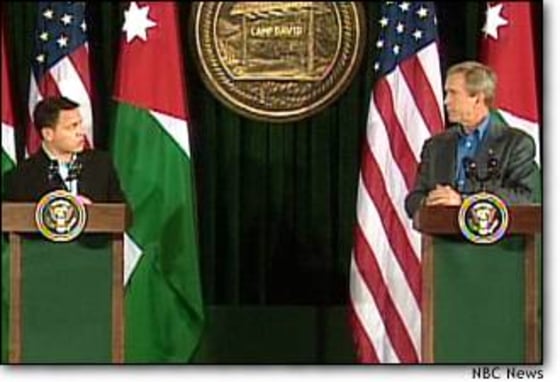President Bush on Thursday placed the blame for renewed violence in Israel and the Palestinian territories squarely on Yasser Arafat, saying the Palestinian president has “failed as a leader” and should be replaced by someone who is willing to fight terrorists.
SPEAKING AT a news conference with Jordan’s King Abdullah II at the outset of discussions between the two leaders, Bush said Arafat forced out former Palestinian Prime Minister Mahmoud Abbas, who resigned Sept. 6 after power struggles with the Palestinian president, and thwarted his efforts to fight terrorism.
”(Abbas’) efforts were undermined, and that’s why we’re now stalled (in implementing the peace plan),” Bush said at the presidential retreat outside Washington.
Despite the spate of violence that has halted progress, Bush said he remains committed to the so-called “road map” to peace and hoped for a Palestinian leadership fully committed to fighting terror.
“I remain committed — solidly committed — to the vision of two states living side by side in peace and security,” he said. “Yet that will only happen with new Palestinian leadership committed to fighting terror, not compromised by terror.”
THANKS FROM ABDULLAH
For his part, Abdullah, a key U.S. ally in the Mideast, thanked Bush for “trying to make our part of the world a better place” and “giving hopes to the Israelis and the Palestinians.”
Afterward, U.S. national security adviser Condoleezza Rice indicated Washington had yet to form a judgment on Ahmed Qureia, the man Arafat has nominated to succeed Abbas as prime minister.
The crux in determining whether the United States supports his participation in the peace process will be whether he is given sufficient authority to control security services, she said.
“The key is going to be the unification of the security services under the Palestinian prime minister, not under some broad committee, not under the president — under the prime minister. ... You’ve got to have someone who can fight off terror,” she said.
On another front in the Mideast, Bush said he does not expect to have agreement on a new U.N. resolution to broaden international involvement in Iraq by the time he addresses the U.N. General Assembly on Tuesday.
“No I don’t think so, but it could be,” Bush said. “We’ll continue to work on it. The whole purpose, of course, is to make sure that nations feel if they need a U.N. resolution, they’ll have one in order to justify participation.
“The other thing is the U.N. resolution must promote orderly transfer of sovereignty to what will be a freely elected government based upon a constitution. The constitution must be written and there will be free elections. Then sovereignty will occur once the Iraqi people are able to express their opinions,” he said. The United States is seeking the Security Council’s backing for a resolution that would clear the way for additional peacekeeping troops and money to finance Iraq’s reconstruction from other countries. The Bush administration has agreed to a vital U.N. role in Iraq. France and Germany, with some support from Russia, want the U.S. occupation ended within months along with more power for the United Nations.
BUSH: POWER TRANSFER IN DUE TIME
But Bush, speaking to reporters Wednesday after meeting with lawmakers negotiating energy legislation, stressed that Iraq needs time to develop a constitution and hold free elections. One of the main elements of the U.S. position is that Iraqis — not other countries — should control when they take over their own country.
Other officials stressed that the administration also will not budge on another main point: the United Nations shall not have the leading role in postwar Iraq.
At the same time, they said the resolution was being reworked to be more specific about a U.N. role. A senior administration official said the United Nations would be offered larger political and economic roles as well as that of coordinator of food and other humanitarian programs.
Meanwhile, a political irritant arose to cloud the Bush-Abdullah session as the United States called on Jordan to restore its freeze on the bank accounts of six leaders of Hamas, an extremist group that has killed scores of Israelis with suicide bombings.
Jordan’s Central Bank retracted a decision this week that had frozen the accounts of six leaders of Hamas and five charities that allegedly funnel money to the group, a minister said Tuesday.
“Jordan has been an important ally in the war on terrorists, including the financial war on terrorism,” State Department spokesman Richard Boucher said Wednesday. “We urge the government of Jordan to restore its order to freeze the assets of these Hamas leaders and charities.”
The Associated Press and Reuters contributed to this report.
